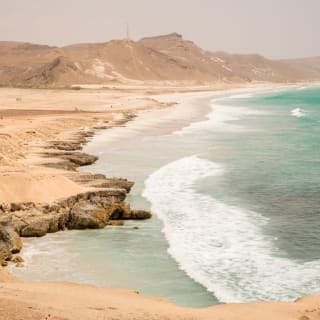
Traditional Making of a Khanjar
Traditional Making of a Khanjar
A Khanjar is a traditional ceremonial dagger. It is still worn in Oman today. Originally, the dagger, whose blade has the shape of a J or a hook, was intended as a weapon for attack or defense. But today it is worn as a ceremonial item and a symbol of status.
Materials used
Weaponsmithing was highly perfected during the Middle Ages in Arab countries. One only needs to think of famous swords and daggers like those of Damascus and it quickly becomes clear that these weapons were Arabian masterworks of quality craftsmanship. The Khanjars, like other pieces made in the Arabian region, are above all works of art. The fine craftsmanship of the Khanjar is one reason it has always been a status symbol. In the past, some of these weapons were only allowed to be carried by members of the Sultan’s family. Today, every Omani man is allowed to wear a Khanjar. The Khanjar is always worn on the left, with its tip always pointing to the right. The type of material the dagger is made from says a lot about the status of the person wearing it. Ivory handles adorn especially valuable Khanjars. In modern times, most Khanjars have wooden, plastic, or camel bone handles. Historically, wood and bone were also the materials that the handles of simpler Khanjars were made of. The amount of gold and silver utilized in the making of the dagger reflects the level of wealth of the Khanjar’s owner.
The making of a Khanjar – a matter between the blacksmith and the owner
Traditionally, each Khanjar was designed by its future owner or by the one who wanted to give it as a gift. Since there are no specific traditional materials for smithing the dagger, each client had to design the weapon with the blacksmith and discuss possibilities for making each individual Khanjar. In addition to the handle and the double-edged blade, the other key elements of a Khanjar are the scabbard and belt. Even these elements reflect how wealthy the wearer is. High-quality Khanjars are worn in a leather sheath with a leather belt – both of course adorned by gold and silver threads.
Today, you can buy a Khanjar at virtually all Souqs in the land. The merchants know of course that tourists consider the spiked dagger a symbol of Oman and are willing to spend a little more on the ceremonial weapon. Unfortunately, what is often overlooked by the buyer is that in many cases, the daggers on display are cheap imitations from India. If you want to buy a high-quality Khadjar, you should definitely take a close look at the goods offered and, if necessary, get advice from a travel guide. In most cases, a plastic handle is a sign of poor workmanship – you should make sure that there is, for instance, a decorative wooden handle.
Discover Oman with experts who have called it their home
Your dream holiday, tailor-made by experts.
We don't just know Oman from books, we visit the country several times a year to experience the culture, landscape and people first-hand.
From your first enquiry to your return home, we are there for you personally - by phone, email or WhatsApp, whenever you need us. Our trips are as unique as you are: individually planned and provided with exclusive privileges and high-quality arrangements that will make your trip unforgettable.
Experts for your Oman trip







